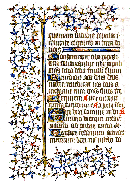Medieval Timelessness
Today, we talk about clocks and timelessness. The University of Houston's College of Engineering presents this series about the machines that make our civilization run, and the people whose ingenuity created them.
 istorians struggle to see accurately into the past through their modern eyes. They look for windows into the way people thought -- in Plymouth Colony or Charlemagne's Court. I found such a window the other night.
istorians struggle to see accurately into the past through their modern eyes. They look for windows into the way people thought -- in Plymouth Colony or Charlemagne's Court. I found such a window the other night.
The four-voice women's ensemble, Anonymous 4, sang a Christmas program of music from the 13th to the 15th centuries. It was a program of pure medieval music, and it was all the work of unknown composers.
It was perfect singing -- no trills, no vibrato -- no urgency. It had the glorious monotony of perfection. You had to listen to it from outside time and space. It was music with no past or future, no climaxes or direction -- only the beauty of Right Now.
Still, the age that gave us that music, 1300 to the late 1400s, was interrupted by bubonic plague and the death of half the people in Europe. It was also the age that gave us the mechanical clock, and therein hangs our tale: As people died, labor became precious -- something to be hoarded and metered. Medieval Europe was becoming time-driven.
But this music came from an age when Europe was still timeless. Time stopped in the ornate initial letters of hand-written medieval manuscript books. They did what medieval music does. Letters, interlaced with delicately inked leaves and tendrils, formed mazes. They drew your mind to trace the weaving forms, under and over, going nowhere. They invited you to meditate.
Time stopped in medieval cathedrals. The mazes built into their tiled floors invited the faithful to enter interior space, to walk a road map of the mind, to follow the maze in the eternal timeless presence of God.
That ended in the clock-driven, forward-moving, future-based world of the Renaissance: the brave and wonderful new world that, in 1517, moved an aging Erasmus to cry out, "Immortal God, what a world I see dawning! Why can I not grow young again?" It was the aggressive clock-driven world you and I still live in.
So, as winter approached -- as the noise and urgency of one more Christmas closed in on me again -- I opened this brief window on an earlier world without time. I listened to four women singing perfectly -- without intermission, without personality -- without haste. I listened to lines of music weaving the maze of Christmas mystery -- over and under -- in some eternal present.
Mechanical clocks and printed books were poised to kill that present tense -- that timelessness. They were about to bind us to the relentless rational face of time. The other night I found a brief reprieve from the clutches of the clock. And I was given a chance to learn medieval history -- by being there.
I'm John Lienhard, at the University of Houston, where we're interested in the way inventive minds work.
(Theme music)
The Anonymous 4 concert was presented at Palmer Memorial Episcopal Church in Houston, Texas, on Monday, November 28, 1994, at 8:00 PM.
For more on the subjective character of time, see Episodes 1005, 1224, and 538.

Image courtesy of Special Collections, UH Library
A typical ornate leaf from a French manuscript Book of Hours, ca. 1275
(Click on the image for an enlargement)